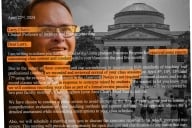You have /5 articles left.
Sign up for a free account or log in.
.jpg?itok=C3OoHyoL)
Vassar College’s female full professors have long been paid less, on average, than their male counterparts.
Universal Images Group/Getty Images
A salary survey released earlier this year showed that men were still making more than women in full-time faculty positions.
The American Association of University Professors, analyzing data from more than 375,000 full-time faculty members across 900 institutions, said men averaged more than $117,000 in annual salary, $20,800 more than women. Excluding assistant and associate professors and only looking at full-time, full professors, men averaged $156,700, $20,300 more than women—and 65 percent of people at this higher-compensated rank were men.
Such faculty pay disparities have long existed; the AAUP’s online trend graphs go back to 2016, showing that the chasm between male and female full professors has widened from the $17,100 disparity back then. A federal lawsuit filed Aug. 30 says they’ve even existed at a historically women’s institution: Vassar College.
“The fact that this is happening at a historically women’s college demonstrates the structural nature of these gender pay inequities, both within academia and elsewhere,” said Michelle Lamy, an attorney for the five female full professors who are suing Vassar.
The lawsuit says female professors have been telling Vassar administrators about their unequal pay concerns since at least 2008.
Vassar is the second oldest of the Seven Sisters, a group of prestigious, historically women-only colleges in the Northeast. Vassar became coed in 1969.
The women’s attorneys are seeking to make the case into a class action on behalf of all current and former female full professors at Vassar back to May 2015. Lamy said expected monetary damages “will be the subject of expert analysis” and that the class will ultimately number at least 65.
Equal Rights Advocates, a San Francisco–based legal, legislative and other advocacy nonprofit that’s also representing the women, provided a letter signed by 36 female full professors or professors emeritae at Vassar supporting the lawsuit. “The harm women at Vassar have suffered goes beyond the loss in compensation over the many years—in some cases decades—we have served the college,” they write. “Vassar’s repeated failure to remedy the ongoing gender wage gap, and the implication that our professional contributions are less meritorious than those of our male counterparts, constitutes a profound institutional betrayal.”
“For the group as a whole, the longer full professors have been at Vassar, the greater the pay disparity,” said Jean Kane, a full professor of English. She said female professors had “very similar experiences” of not being rated as highly as men, which can affect pay.
Kane was among the 36 who signed the letter. Several other signers, who were contacted by Inside Higher Ed, plus a few of the named plaintiffs, referred questions to the lawyers.
The college didn’t comment on the case beyond providing a letter to the editor that Elizabeth H. Bradley, Vassar’s president, wrote to the student newspaper.
“The faculty members who made these claims are highly valued members of our community and integral to the quality of education at Vassar,” Bradley wrote in The Miscellany News. “Vassar has always been committed to gender equality and seeks to promote equity in all that it does.”
“The faculty members who brought this lawsuit have a different understanding of the relevant facts and law that is at issue in this dispute,” she wrote. “Annual faculty salary increases are guided by a faculty-led peer-review process … The parties have been trying for several years to resolve these differences, and now some faculty have chosen to have their view adjudicated in a court of law. That is their right, and I respect that.”
Lamy said New York’s “equal pay law is agnostic as to the reason of the pay disparity.”
The five current plaintiffs in the case include members of the English, history and film departments, but also a physics professor and a psychological science professor.
The case, filed in U.S. District Court in the Southern District of New York, seeks monetary damages, equal pay for female full professors performing “substantially similar work” to their male colleagues and an end to allegedly discriminatory promotion and evaluation practices.
“Vassar still proudly identifies as a ‘pioneer for women’s education,’ and asserts that the ‘unique traditions upon which the college was founded continue to be upheld today,’ including ‘a commitment to the advancement of equality between the sexes,’” the lawsuit says, quoting from Vassar’s website. “Despite publicly claiming a storied role in the movement for gender equality, Vassar has long and privately been underpaying its female professors. Average salary data shared with The Chronicle of Higher Education reflect a gender pay disparity for full professors at Vassar in every year for the last two decades.”
The latest year from those Chronicle data, 2021–22, showed Vassar’s male full professors averaged $153,200 — $13,900, or 10 percent, above their female colleagues. The pay gap was as high as 14.6 percent in 2019–20, but it was only 7.6 percent about 20 years ago, according to data in the case.
The lawsuit says Vassar’s own study of 2020–21 data, conducted after female full professors asked Bradley to fix the disparity, found the “gap was most pronounced among the longest-serving women: The gender difference in median annual salary among full professors serving 20 or more years post-tenure was roughly $30,000.”
AAUP data from last fall show Vassar’s male full professors averaged $156,800, $11,000 above their female coworkers. Vassar had 47 male and 50 female full professors.
The suit says that in recent years, in response to the women’s concerns, some of them received pay bumps “as low as $1,000,” while others received no adjustments.
There are five other Seven Sisters colleges, after Radcliffe College officially merged with Harvard University in 1999. According to those 2022 AAUP data, four had pay disparities in which female full professors made less than male full professors, though the gaps weren’t as wide as Vassar’s: women made $600 less than men at Bryn Mawr, $1,600 less at Wellesley, $4,200 less at Smith and $9,900 less at Mount Holyoke.
In an emailed statement, Mount Holyoke said it launched a compensation study last fall and expects results in early 2024. “In the meantime, it is important to note that of the 14 promotions to full professor since 2020, 11 were earned by female faculty,” the college said. “Historic gaps are also likely to narrow considerably with upcoming retirements, annual pay growth for faculty and investments in the professional development of associate and assistant professors.”
At one of the Seven Sisters, Barnard, female full professors made $11,200 more than male professors last fall.
When all Vassar professor ranks were taken into account last fall, men averaged only around $1,900 more than women. That gap has been closing since fall 2020. And, last fall, for the first time since fall 2017, Vassar’s female assistant professors averaged more than their male counterparts, to the tune of $1,500.
Starting pay, and allegedly delayed promotions, factor into the lawsuit.
“Because pay increases are a percentage of prior salary at Vassar, that initial disparity grows exponentially over class members’ (often multi-decade) careers,” the suit says.
The suit says Vassar “falsely asserted that any pay gap is the result of the fact that men are simply higher performers or simply better at leveraging offers to negotiate higher salaries. In other words, Vassar’s response to a group of their distinguished senior faculty raising concerns of gender pay inequity boiled down to: Men make more money because men are better or, if not, Vassar has decided it is acceptable to pay men more for the same job.”







.jpg?itok=SMtcLEhK)
